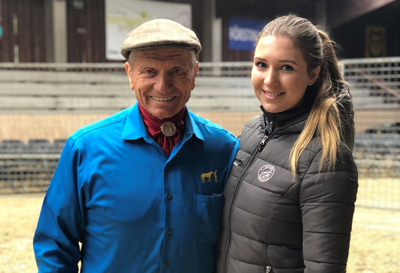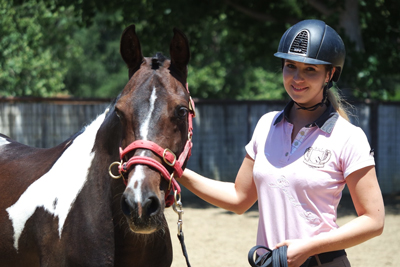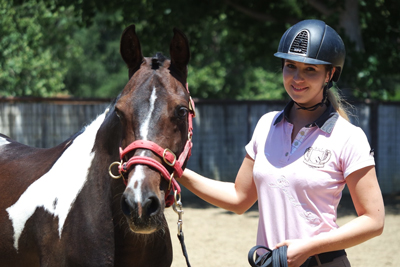You live, and you learn – There’s not a soul on the planet who hasn’t heard or said this adage at least once. And it’s true, of course. Thus, earlier this summer, our colleague Franziska spent three weeks in Golden State California to intensify her horse-assisted coaching knowledge and practices. Here, she shares with us a short summation of her experiences, insights and purpose.
“Unlike most visitors, my travels in the States did not take me to San Francisco, San Diego or Los Angeles. I was bound for Buellton, a small town on California’s coast and home to Monty Roberts, the world-renowned horse whisperer. On his remarkably large farm, Mr. Roberts has established an international learning center where he and his team offer a variety of training courses.
In 2018, I attended a two-week horse-assisted coach course in Munich, followed by two days of practical and written exams in Dresden in 2019. With this background, I felt ready for the three-week training in the U.S.A. Horse-assisted coaching is unique in that the trainer, a horse, couldn’t possibly be more impartial and nonjudgmental. In order to asses the results of horse-assisted coaching, you need to understand horses and their behavior. I have lived and worked with horses since I was two years old, so I know them rather well. Still, you live, and you learn, which is why I was eager to attend an advanced training course at Monty Roberts’ learning center.
During training, I had the privilege of working with wild mustangs, whose instincts — particularly their flight instinct – are much more sharply honed than those of our domestic horses. Five mustangs in the herd were second generation, i.e. they were born in captivity and had had, albeit very little, contact with human beings. Three other mustangs had had no contact with two-legged creatures at all, which posed the first challenging question: How do I behave in the presence of wild horses? How can I convince them of something they have never encountered before and, from their point of view, is a possible threat?
I was fascinated by the mustangs’ reaction to every syllable in my body language. Each position, the smallest movement triggered a reaction. Reading the horse’s mood, calculating his or her reactions and timing my messages well – these were the vital elements of our encounters. Domestic horses may react similarly, but they are accustomed to us and their responses are less acute. Every one of us approaches such challenges differently, and how we face them reflects our personality. Can I wholly engage with my counterpart? Can I sense when I’ve gone too far? Do I tend to press my counterpart against the wall or am I more circumspect, more cautious? You might at first have your doubts that engaging with horses will improve your leadership abilities, yet we can learn so much from them. Horses teach us to be patient and empathetic. We learn to approach our counterpart, two-legged or four-legged, with respect, to request instead of demand, to suggest instead of laying down the law. We also learn to be clear about what we wish to communicate and to create an atmosphere in which each person is motivated and willing to perform allocated tasks to their best ability.
The training gave me profound insight into the impact of my body language. It taught me the importance of physical consciousness. Not only horses register the smallest movement or shift in position. We all do on a subconscious level, parsing, analyzing and rating the sentences our bodies speak.
My next step will be a two-week practical and written exam in the spring of 2020 followed by a three-month work experience in California where I will earn the right to call myself a Certified Monty Roberts Instructor. Working with wild horses was a most enriching experience and I am very much looking forward to learning more in California.”






